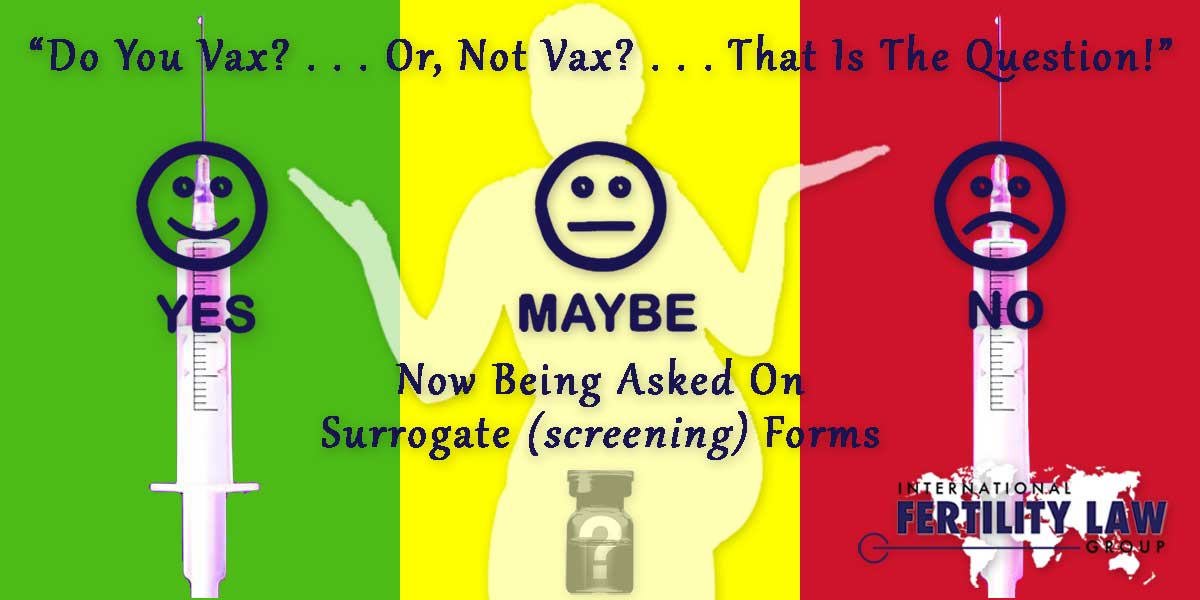
08 Dec 2021 COVID-19 Vaccination Question Now Part of Surrogacy Agreements
The COVID-19 pandemic has added a new critical area of questions to consider in matching intended parents and potential surrogates: COVID vaccination status—is the surrogate vaccinated? Do the intended parents want the surrogate to be vaccinated? Is the surrogate willing to be vaccinated? If she is not vaccinated prior to pregnancy, how do the parties feel about vaccination during pregnancy? What about booster shots? Intended parents and surrogates must address these questions early in the process—ideally during the matching process, but certainly as part of the surrogacy agreement itself.
Today, most surrogacy agencies and third-party matching organizations include questions about COVID vaccination status and preferences as part of their application processes. As new variants of the virus emerge, extending the need for public health measures and travel restrictions, it appears increasingly likely that COVID vaccination will, for quite some time, remain an important question to be addressed before entering into surrogacy agreements.
Surrogacies Delayed by COVID-19 Pandemic
The impacts of the COVID-19 pandemic on all aspects of human life are myriad and ongoing. The American Society for Reproductive Medicine (ASRM) advised fertility clinics at the time of the first pandemic lockdowns to pause all ongoing procedures other than emergencies and to put a hold on beginning new cycles. Early on, with much of the world on lockdown, intended parents who had traveled abroad for surrogacy found themselves stranded with their newborns, unable to return to their home countries. In many cases, COVID travel bans prevented or disrupted parents’ travel to be present at their babies’ birth.
The fertility industry quickly developed new COVID-19 protocols, enabling them to ramp up fairly quickly and to operate safely amid a post-lockdown rush on services. A combination of factors—restarting of postponed procedures, post-lockdown urgency to travel and visit loved ones, etc.—resulted in a mismatch between the demand of intended parents seeking a surrogate and the supply of surrogates available. Agencies now consistently report massive decreases in the availability of eligible surrogates, resulting in significantly expanded wait times for an appropriate match. As reported by Fortune in March, the head of one New Jersey surrogacy agency reported a more than 60 percent decrease in eligible surrogates compared to prior years.
Now, in a country and world that is deeply polarized in its views on COVID-19, divisions surrounding COVID vaccination have only added to the complexity of making a successful parent-surrogate match.
Intended Parents, Surrogates Must Agree on COVID-19 Vaccination
One complicating factor is the same polarization that has split the U.S. population over issues of COVID vaccination requirements, masking and other public health measures. Most agencies have reported that while the overwhelming majority of their intended parent clients insist their surrogate receive the COVID-19 vaccine before becoming pregnant, only a minority of would-be surrogates are willing to get or have received the vaccine.
Of course, there are other cases in which the opposite is true: Some intended parents insist that a surrogate be and remain unvaccinated for the duration of the pregnancy.
One important purpose of a surrogacy agreement is to ensure the responsibilities and rights of all parties are defined, documented and agreed upon. Typically, a surrogacy agreement specifies that a surrogate will undergo certain health and mental health screenings, that she will receive appropriate pre-natal health care, and that she will comply with certain restrictions on her behavior during the pregnancy. Of course, foundational to any surrogacy agreement is the principle that the surrogate retains the ultimate right to make decisions about her own health.
COVID-19 has now become part of the conversation, mostly before entering into a surrogacy agreement, but sometimes during contract negotiations as well. The issue is highly likely to remain part of these conversations for a long time to come, possibly even permanently. Whether or not the surrogate is vaccinated, or whether she will become vaccinated, receive a booster, or forego vaccination or boosters as a condition of the agreement, should now be documented for every surrogacy. While medical science doesn’t yet have all the answers about this new virus, its risks, and its long-term impacts, many questions will be answered with time and more data. It is the hope of our team at IFLG that confusion and concerns of intended parents and surrogates alike will be alleviated over time, as clear answers, based on sound science, emerge. For now, clarifying and documenting agreement around COVID-19 vaccination is critically important for intended parents, surrogates and the professionals who serve them.

















